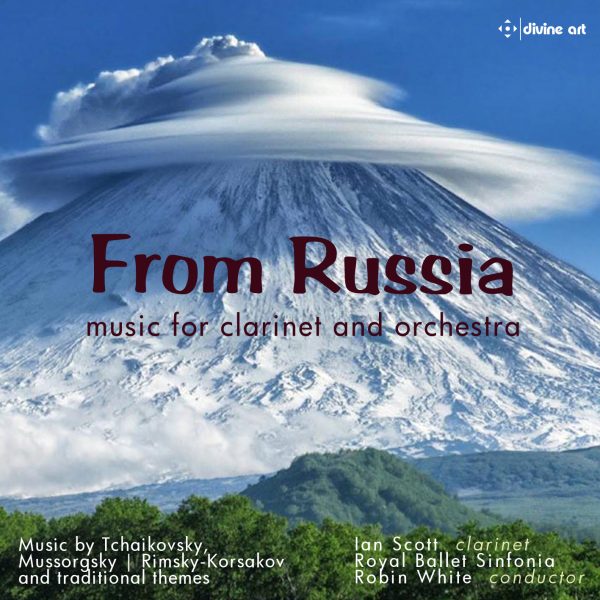Clarinet & Saxophone
I’ve always found the French and Russian composers of the Romantic and early 20th century to be the finest of orchestrators, producing wonderful solos and small ensemble passages for woodwinds within large-scale symphonic, concertante and theatrical works. Despite many superb melodies for clarinet in the Russian symphonic repertoire, there is very little Russian music for solo or accompanied clarinet. Off the top of my head, I could bring just two concertos to mind, those of Rimsky-Korsakov and Stravinsky, and a search revealed very few notable additions.
Conductor, composer and arranger Robin White had similar thoughts. A Russian Suite, the central work on this new disc From Russia on Divine Art Records, is surrounded by new arrangements of familiar works for clarinet and orchestra. Royal Ballet Sinfonia principal clarinettist Ian Scott was approached initially by White some 10 years ago, and the project finally took shape with the recording sessions taking place during 2020 and 2021 when restrictions allowed. All the arrangements are recorded here for the first time.
White describes having written A Russian Suite ‘for the hell of it’, which is as good a reason as any. The work emerged due to a combination of factors. The awareness of a dearth of Russian clarinet repertoire and his work with many clarinettists in the past made the instrument a clear choice, while the selection of folk melodies lent themselves to a suite rather than a traditional concerto. The work had been performed before, but this was the first opportunity to place it on record.
It consists of five movements, each reworking a traditional Russian dance or song. None have specific titles, but further details are given in the sleeve notes. Movements 1 and 5 are the dances – 1 is a dance using the melodic ‘The Little Apple’ from Gliere’s opera The Red Poppy; 5 is a gopak, the clarinet playing call and response with the orchestra and a joyous sound after the three minor-key songs before. Of the songs, 2 and 4 are slow, beautiful, sad melodies – the warm, dark sound of Scott’s low register exploited by White. Although 3 is a song, it could easily be a lively dance. All three songs were familiar, but I couldn’t recall the titles. The large orchestra – double winds minus clarinets, full brass, harp and a range of percussion – is used effectively. The percussion adds some unique colours, including subtle use of the vibraphone in movement 2. However, while orchestrating these folk songs has already and intentionally transported them away from their Russian roots, perhaps the vibes was a step too far. The beautiful dark cor anglais is a wonderful sound, and in fact, White’s ability to go from minimum soloist support to full, tutti orchestra is one of the delights of the suite. The clarinet is always heard clearly within the texture.
The Rimsky-Korsakov Clarinet Concerto was originally written for clarinet and military band. White’s arrangement here is a thoughtful reworking, with the strings taking the original clarinet section lines. This spirited performance is perhaps representative of a more forward-looking and positive work by a Russian composer. It is a lovely concertante work, and perhaps not performed as often as it should. The remaining pieces are arrangements of already familiar tunes from Mussorgsky and Tchaikovsky.
Mussorgsky’s Sorochinsky Fair consists of two delightful movements, a slower ‘Introduction’ and a familiar ‘Gopak’. While the clarinet has a prominent role, it feels much more orchestral with solos shared between the woodwinds.
The four Tchaikovsky pieces are crowd-pleasers but have been orchestrated sympathetically. Andante cantabile from String Quartet No 1, originally a cello feature, comes first and is carefully performed using only strings and harp, with the low register of Scott’s clarinet again exploited. Two short works for solo piano, Humoresque from Op 10 No 2 and Valse from Album for the Young, transfer well to orchestra – a tribute to White’s orchestration as well as appreciating the quality of Tchaikovsky’s originals. I particularly enjoyed the addition of sleigh bells in the ‘Humoresque’. In between the two piano works we have None but the Lonely Heart, a song from Six Romances Op 6 for voice and piano.
The final piece on the disc, described as ‘a visitor from Italy’, is the Czardas by Vittorio Monti. While not directly Russian, the Slavic feel is the connection required to justify its inclusion.
White’s orchestrations are delicate at times – allowing the clarinet to come through when required – but also don’t shy away from full-bodied orchestral tuttis with a depth and resonance that complements the original composers. Scott’s beautiful clarinet sound and assured technique clearly demonstrate why he was wanted by White for the project. The Royal Ballet Sinfonia players were distanced further from each other than they would have ideally wanted due to the pandemic, but the ensemble is tight and has certainly not affected the quality.
Sheet music for White’s arrangements will be published in due course. At the time of writing, I was able to see scores for A Russian Suite, the Rimsky-Korsakov Concerto, Tchaikovsky’s Andante Cantabile and Monti’s Czardas, and while these were in proof form, I was able to see White’s technique in closer detail. I also played through some of the clarinet lines, which were as much fun to play as to listen, so I look forward to seeing these published in the future.
@divineartrecordingsgroup
A First Inversion Company
Registered Office:
176-178 Pontefract Road, Cudworth, Barnsley S72 8BE
+44 1226 596703
Fort Worth, TX 76110
+1.682.233.4978





![🎧 Listen now to the @purcellsingers' first single from their upcoming album, #ASpotlessRose! ➡️ listn.fm/aspotlessrose [in bio]](https://scontent-dfw5-2.cdninstagram.com/v/t51.71878-15/642752592_1424641949105789_8815810652567824072_n.jpg?stp=dst-jpg_e35_tt6&_nc_cat=106&ccb=7-5&_nc_sid=18de74&efg=eyJlZmdfdGFnIjoiQ0xJUFMuYmVzdF9pbWFnZV91cmxnZW4uQzMifQ%3D%3D&_nc_ohc=aY1NGfNpOoYQ7kNvwEQjDAp&_nc_oc=Adk0xf3LQWgJwdUp-RHDVZU8otY-9ykQJQLyswH0I4YWNoqXAeVAFLejZ20hKcZW-1w&_nc_zt=23&_nc_ht=scontent-dfw5-2.cdninstagram.com&edm=ANo9K5cEAAAA&_nc_gid=8SooBU3XPCP30y8d3CPMSw&_nc_tpa=Q5bMBQGl7WuyIj5yX3vJ35uEBHbk6OiOkOgExymitzP-qBdS_0kL2RrirgcR_-t8UhVVzZkbGtYQQubeZg&oh=00_AfxeS30cKFUWyDcV1TzVzKFEgczl9EHdgIkTmEGFcYNF8A&oe=69AE6401)






